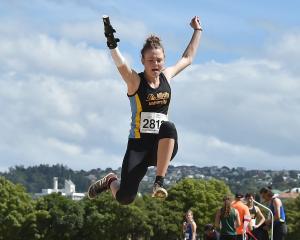
The Dunedin mother of four labelled 2024 the "resilience Olympics" after the curveballs thrown her way as she embarked on her bodybuilding journey.
Her son, Ashton, 20, was hurt in a street attack after debuting for his new rugby club in Weston, in southern England.
She also lives with fibromyalgia, a chronic pain condition, works two jobs, and cares for her other children, Tiahli, 26, Coby, 15, and Niko, 14.
Her schedule is busy but Booth found time to win two world titles at the ICN World Natural Games at the Australian Institute of Sport in Canberra recently.
Despite being proud of her titles, and resilience, Booth said she saw the negative effects of her sport.
Booth, 46, who dabbled in bodybuilding originally nearly 10 years ago, won the South Island overall figure title in July and was on track to compete at the national championships.
After her son was attacked overseas, she opted to pull the pin, until he encouraged her to keep going.
That was good advice — Booth walked away with a gold medal, two silvers and a fourth place.
Preparing for the world event, Booth ended up with stress fractures in her shins and could hardly walk.
It shifted her goal posts and she was determined just to make it to Australia and "not look out of place".
She was crowned world champion in the figure novice and classic figure 40-plus categories and also picked up a silver, bronze and a fourth place and a pro-qualified card.
"To place in every single event that I entered and to win two of them, considering everything . . . is crazy," Booth said.
"There’s just been so many times that I could have quit through injury, through stuff with my son, and just my workload.
"On top of that, I live with a chronic pain condition that people originally said ‘you’ll never be able to do body building’."
She spent up to four hours a day training at Olympic Gym, where she also taught group fitness classes, and the rest of her time was spent organising her meals.
"It’s not a sport, it’s a lifestyle."
Without her support network of her children, husband Owen, and friends Mike Tabb, Gary Chalkin and Nicole Hellyer, Booth does not know where she would be.
Booth is using her experiences for research through her role as a senior lecturer at the Otago Polytech’s Institute of Sport, Exercise and Health.
She kept a diary through preparation and competitions and is writing her reflections.
"It’s an interesting process to take myself out, look at my own experiences and go ‘man, this sport’s screwed’.
"You’re putting yourself in a position where people are judging you whether you have worked hard enough and whether you look good enough aesthetically.
"How is that not going to screw with you head? It does."
The mindset after competition had been hard to shift through, watching her body return to "normal".
"If you time your food right, and your water right, you get the science right, you only look like that for about 20-30 minutes.
"That’s the photos that everybody shares . . . yet it’s such a short period of time.
"So when we go back to looking normal, we feel anything but — and that’s really hard."
While she would "never say never" to competing again, she would not recommend anyone taking up the sport.
If they did, they should have a good support system, share as much as they can with their families, and take "before" photos.
"Make sure that you take lots of photos of yourself when you’re looking normal, because later on when you start to go back to that looking normal, you can see, actually, this is me."
She encouraged people in the fitness industry to be more responsible with what they posted on social media and not just show the highlights.
"There’s nothing more inspiring than someone getting out there smashing it who has a normal-sized body."












